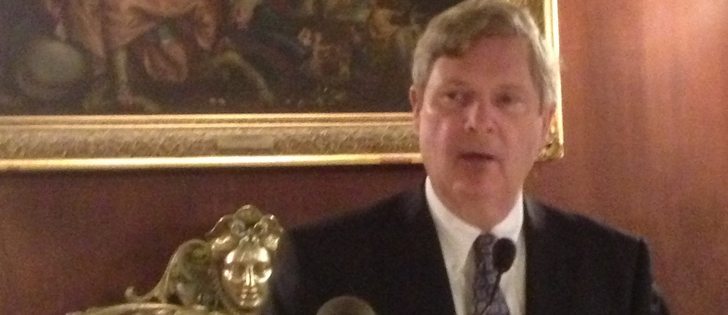WASHINGTON, D.C. — The U.S. government has no intention of changing its stance on country-of-origin labelling.
U.S agriculture secretary Tom Vilsack plans to meet with Canadian agriculture minister Gerry Ritz tomorrow to discuss trade and border issues among other things.
But Vilsack indicated no interest in accommodating Canada’s rejection of COOL changes the U.S. has proposed to address a WTO ruling. That ruling was on a challenge launched by Canada and Mexico. The WTO said COOL was protectionist law and not an effort in consumer education.
The U.S. has until May 23 to get rid of COOL or make it compliant with the WTO ruling.
Canadian livestock groups and the federal government were disappointed when the U.S. on March 11 published a 44 page rule to amend COOL. The changes will make it even more difficult to export livestock to the U.S. One estimate says the new rule will cost the Canadian livestock industry more than $1 billion a year.
Initially Vilsack expressed disbelief that the U.S. response to the WTO rule was a surprise to Canadians.

“Come on, they weren’t surprised.”
He then elaborated, stating that the U.S. intends to do only that which it thinks will make it comply with the WTO ruling.
“It is solving the problem that the WTO presented to us,” Vilsack said in response to a reporter’s question. He was speaking at the annual meeting of the North American Agricultural Reporters association in Washington, D.C.
“WTO basically said, ‘it is OK for labels to be affixed and it is OK for consumers to be informed, we just didn’t like the way you did it.’ So we’re going to try to do it in a way that answers any questions about where something may have been raised, where something may have been processed or slaughtered.
Read Also

CFIA says regulatory changes will cut agricultural red tape
The Canadian Food Inspection Agency (CFIA) is set to make seven regulatory changes to cut red tape around agricultural production.
“In doing so, we provide consumers information. We think it is very consistent not just with the spirit, but also with the legal requirement that the WTO panel presented to us.
“That is the reason we did it. We want good relations with everyone, obviously. Mr. Ritz and I are meeting tomorrow (Tuesday) and I suspect part of our conversation will not only be about COOL, but also about the Beyond the Borders initiative that tries to make things flow more easily across the border and I think we are having some success in that.
“We do have a legal responsibility to comply by the end of May and we believe this regulatory proposal we have put forward is in fact a solution to the problem the WTO has created for us.”
If the U.S. proposals are enacted May 23, Canada would have to return to the WTO to argue the changes are inadequate and ask for the right to level tariff retaliation.

















